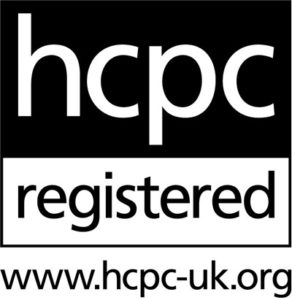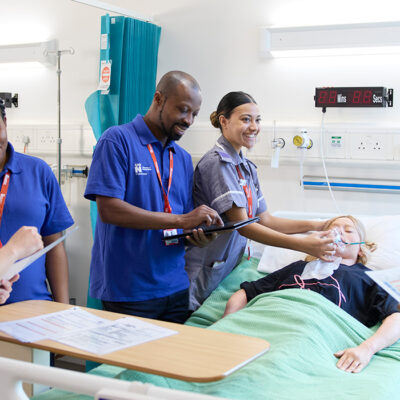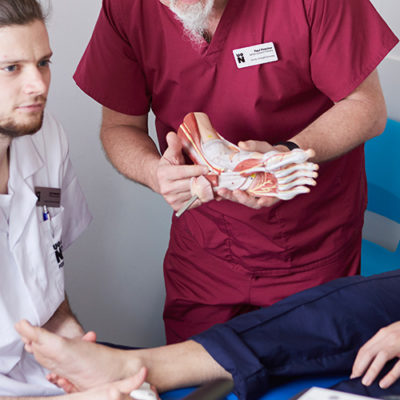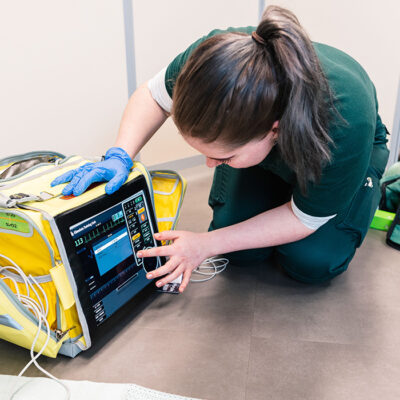
Deborah Hewson
Senior Lecturer in Occupational Therapy
Faculty of Health, Education and Society
DiscoverUCAS Code
B930
Level
Undergraduate
Duration
3 years full-time
3 years full-time extended
Starting
September
BBC at A Level
DDM at BTEC
Fees UK 24/25
Full Time: £9,250
Fees International 24/25
Full Time: £16,200
Location
For questions regarding study and admissions please contact us:
The University of Northampton’s BSc Occupational Therapy degree prepares you to work as a registered occupational therapist in the UK and overseas. Occupational Therapy is a health and social care profession that enhances the health and well-being of individuals to enable them to achieve their full potential. Occupational therapists work with people of all ages to help them overcome the challenges of everyday life resulting from illness, trauma and ageing.
Successful completion of the BSc Occupational Therapy degree will allow you to apply for registration with the Health and Care Professions Council (HCPC). In addition, it will also give you an opportunity to obtain a licence to practice and become a member of the Royal College of Occupational Therapists.
Top 18 for Occupational Therapy courses: The University of Northampton is the top 18th institution for Occupational Therapy courses in the Complete University Guide league tables for 2024.

Updated 15/04/2024
The University of Northampton’s Occupational Therapy degree equips you with the knowledge and skills that you will require for professional practice through combining the study of occupational and human sciences with hands-on learning in a practical setting.
We were one of the first Occupational Therapy courses to be established in Britain. We have strong connections in the local area and offer a wide range of exciting local, national and international practical placement opportunities.
You will have an opportunity to engage in professional practice within a variety of health and social care settings across public, private, voluntary and independent sectors. The range of placements in traditional and non-traditional settings enables you to develop and advance your skills in assessment and intervention with clients. You will be encouraged to consider the evidence base for current practice throughout the Occupational Therapy course.
The World Federation of Occupational Therapists stipulate that occupational therapy students need to complete 1,000 hours of assessed practice. You will complete one placement for each year of your course that will meet this requirement.
Placements are available in a variety of settings and we work closely with the students to provide a range of practice opportunities. Overseas placements opportunities are available for second and third year students and funding is available through the Erasmus Scheme for placements within the EU.*
Studying the BSc Occupational Therapy degree offers you many opportunities including:
The BSc Occupational Therapy degrees delivered in three formats:
We also offer an Occupational Therapy apprenticeship programme which is accredited by the Health and Care Professions Council and the Royal College of Occupational Therapy. For further details on apprenticeships click visit our apprenticeships webpage.
All of the University of Northampton’s Occupational Therapy BSc graduates gain an academic degree which will then allow you to apply for registration with the Health and Care Professions Council (HCPC) to obtain a licence to practice and become a member of the Royal College of Occupational Therapists.
You will be taught by qualified Occupational Therapists who also have additional teaching qualifications, Masters or PhD qualifications. Our teaching staff have a variety of clinical backgrounds and expertise from mental health, physical areas, paediatrics and learning disabilities.
The Full Time occupational therapy degree is approximately 20 hours of direct contact plus 15 dedicated study hours per week across standard university terms. The Full Time Extended course is approximately 14 hours of direct contact plus additional study hours per week, extended over 45 weeks of the year.
Please note the modules shown here relate to the academic year 23/24. The modules relating to the academic year 24/25 will be available from June 2024.
All Occupational Therapy BSc applicants must have:
You will need to have five GCSEs including Maths and English at Grade C/4 or above .
You will also need one of the following qualifications (or equivalents):
We welcome applications from students with a mix of A levels and BTEC/Cambridge Technical qualifications.
You will need to provide evidence of successful recent study at degree entry level. We will also consider other recognised professional courses that are not listed above, please contact our Admissions Team to discuss this on an individual basis. Each application is considered on its own merit so if you are unsure if you have the skills, knowledge, or qualifications to apply, please contact us.
For more information on how to make an application, please visit our How to Apply page.
If you are an International student and would like information on making an application, please see our How to Apply page.
All International and EU students applying for an occupational therapy course with us must meet the following minimum English language requirements:
For information regarding English language requirements at the University, please see our IELTS page.
Fees quoted relate to study occupational therapy in the Academic Year 24/25 only and may be subject to inflationary increases in future years.
Fees quoted relate to study occupational therapy in the Academic Year 23/24 only and may be subject to inflationary increases in future years.
For placements, Occupational Therapy students may incur additional accommodation and travel costs.
Financial contribution towards your travel and expenses, in relation to your practice learning opportunities, may be available for you from the NHS Learning Support Fund. Details, including eligibility criteria, can be found on the NHS website.
For more information about possible funding options, please visit our Fees and Funding pages.
At the University of Northampton, everything we do, from funded trips to paid internships, is to give you everything you need to make a difference when you leave.
If you join our full-time Occupational Therapy degree at the University of Northampton, you will receive a laptop when your course begins*. The laptops are built to a bespoke custom specification ideal for use in the seminar room, collaborative group work or studying at home.
Whatever your ambitions, we’re here to help you to achieve them. We’ll support you to identify the skills you’re learning during your occupational therapy course, find your strengths and secure practical experience so that when it comes to applying for jobs or further study you’ll feel confident in standing out from the crowd. We’ve created the Northampton Employment Promise because we are so confident that if you focus on your studies and complete one of our awards you’ll be highly employable by the time you graduate. Putting you in a great position to secure employment or continue your studies.
To check out the full list of perks, visit our Student Perks page or dedicated International Perks page.
* UK fee payers only (see Terms and Conditions for further details)
We have 3 routes in the BSc (Hons) Occupational Therapy:
Some modules are completed with FT, FTE and apprenticeship students together. All routes are completed within 3 years.
Our occupational therapy degree incorporates a range of learning and teaching methods to engage you in active learning. This includes technology enhanced learning through online workbooks, activities and interactive discussions: classroom based learning through seminars, skills workshops, tutorials and practice–based learning. You will be a collaborator in learning with your tutors, peers and practice educators.
The University of Northampton’s Occupational Therapy team is involved in research across many clinical areas including frailty and dementia. We are working with local partners in strategy development and are encouraging of social entrepreneurship with resources and expertise within the staff team.
A diverse range of assessments are included in the course to ensure academic and professional competence and to prepare you for the role of an Occupational Therapist. This includes written assignments, multiple choice question tests, poster presentations, group work, reflective essays, case studies and practice portfolios. You may work together in groups for some assignments.
Support is provided by tutors for all module assignments in the form of assessment tutorials and marking criteria.
There are opportunities throughout the course to get involved in events and activities. We have excellent links with local organisations for volunteering. We have a strong Occupational Therapy community, the student Occupational Therapy Society arrange regular activities, we participate in National OT Week and various events throughout the year.
Open Days give you the best experience and insight to courses, people and facilities that interest you. Make your choice easier and come meet us.
Senior Lecturer in Occupational Therapy
Faculty of Health, Education and Society
DiscoverSenior Lecturer in Occupational Therapy
Faculty of Health, Education and Society
DiscoverSenior Lecturer in Occupational Therapy
Faculty of Health, Education and Society
DiscoverSenior Lecturer in Occupational Therapy
Faculty of Health, Education and Society
DiscoverLecturer in Occupational Therapy
Faculty of Health, Education and Society
DiscoverSenior Lecturer in Occupational Therapy
Occupational Therapy BSc (Hons)
DiscoverSenior Lecturer in Occupational Therapy
Faculty of Health, Education and Society
DiscoverSenior Lecturer in Occupational Therapy
Faculty of Health, Education and Society
DiscoverSenior Lecturer in Occupational Therapy
Faculty of Health, Education and Society
DiscoverSenior Lecturer in Occupational Therapy
Faculty of Health, Education and Society
DiscoverSenior Lecturer in Occupational Therapy
Faculty of Health, Education and Society
DiscoverOccupational Therapists work in diverse areas of practice. Opportunities are available in the UK and abroad with a wide range of career options; the National Health Service, Social Services, private practice, special education, the prison service and in the voluntary sector.
The University of Northampton’s occupational therapy degree is structured to provide you with support. The final year of the course is designed to enable you to prepare for applying for your first job within the field of Occupational Therapy.
If you are a qualified occupational therapist and are looking to return to practice you will find information about financial, clinical and academic support available to return to practice by visiting the Health Education England website. There is bespoke return to practice support at the University of Northampton, please contact our OT Team.
Our postgraduate and Master’s courses are a great way to enhance the skills you have already learnt. Benefit from our 20% alumni discount graduate-discount-scheme/ on postgraduate fees.
Successful completion of this Occupational Therapy degree could lead on to one of our postgraduate programmes: MSc Advanced Occupational Therapy, Doctor of Professional Practice in Health and Social Care.
“I wanted people to thrive and be their best selves by using ‘OT’. It’s been a rewarding journey and I was reemployed as an Occupational Therapist, a role I’m still enjoying now.” - Hannah Osborne -
The Learning Hub is at the heart of the campus and home to the student information desk.
Discover
Our nursing course will give you the ability to cope with a demanding and satisfying profession leading to BSc Adult Nursing (Hons) and registration with the NMC.

Our Podiatry course aims to produce graduates who are fit for practice within the NHS or private sectors within the UK and overseas. Apply today.

This course will provide you with the components to equip you with the required competencies to become a Paramedic registered with the Health and Care Professions Council.

This is a 2 year full time FdSc with a 50/50 split between theory and practice learning.